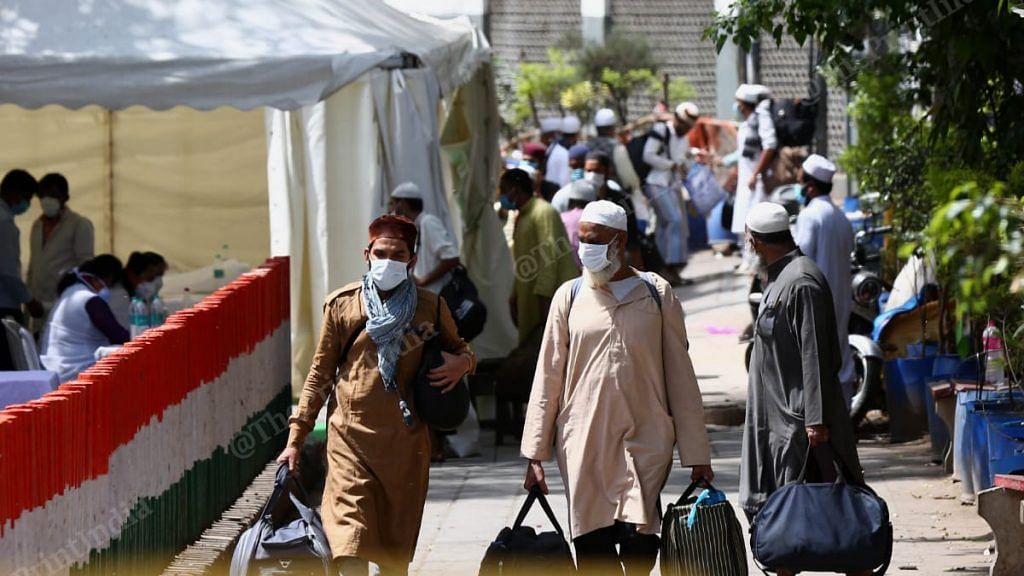After the Shaheen Bagh anti-CAA protests, the gathering of the Tablighi Jamaat at Delhi’s Nizamuddin Markaz on 13-15 March has become a serious cause of worry amid India’s nationwide fight against the deadly Covid-19 pandemic.
What are common to both incidents is that they involve a section of the Muslim community and vested interests playing on the religious sentiments of the fellow community members. There was also a loud exhibition of stridently anti-government sentiments in Shaheen Bagh and defiance of lockdown in Markaz gathering. In both cases, the string pullers seem to have deep pockets and abundant political motive.
According to media reports, the Delhi Police was ineffective in getting the Markaz area vacated and Home Minister Amit Shah had to seek the assistance of National Security Adviser (NSA) Ajit Doval to do the police’s job. Maulana Saad, the now absconding chief of Tablighi Jamaat, which currently operates from its office at Nizamuddin in Delhi, had refused to yield to pleas from the Delhi Police to vacate the Banglewali Masjid. NSA Doval reportedly reached Markaz around 2.00 am on 29 March and convinced Saad to get the area vacated and have the members tested for Covid-19. It worked.
The government was well aware of the seriousness of the situation building up. Earlier, in another congregation at Karimnagar in Telangana, 10 Indonesian preachers travelling on tourist visas as against under the missionary category had tested positive for Covid-19, forcing the security agencies to ring the alarm bells.
Was the Markaz incident a mere law and order situation gone wrong or was it a serious security lapse? The Narendra Modi government must at some stage put these questions to rest. It is strange that the Tablighi Jamaat members who attended the gathering in Delhi were allowed to return to their respective towns without any checks or quarantine, considering the number of positive Covid-19 cases had begun to rise significantly late last month. This is a serious security lapse, which has turned into a health hazard and an invitation to an avoidable disaster.
Also read: Coronavirus was a test of secular nationalism. Then Tablighi Jamaat became the scapegoat
Difficult to trace preachers
Meanwhile, the Covid-19 cases have suddenly gone up, with the spurt mainly attributed to those who attended the Tablighi Jamaat meet at Nizamuddin. The gathering was reportedly attended by more than 3,000 members, including about 800 foreign preachers of the Islamic organisation, which is believed to be popular in some Asian countries. One of the six core principles of Tablighi Jamaat is Dawat-o-Tabligh (proselytisation).
The foreign preachers didn’t enter India on missionary visas, which would have limited their movement in the country to specific locations. Because they came on tourist visas, tracking their travel itinerary is extremely difficult now. This is not good news in terms of tracing people with whom they may have come in contact.
While tracing their contacts looks impossible, most of the foreign preachers themselves are yet to be traced. Intelligence Bureau (IB) director Arvind Kumar has reportedly told state DGPs to scan all Tablighi Jamaat congregations held in other parts of the country such as Karimnagar in Telangana; Malappuram (and some other towns of northern Kerala); Erode, Nagore, and Ramanathapuram in Tamil Nadu; and a few towns in the coastal areas of Karnataka. The Union home ministry has also sought details on all such Tablighi Jamaat preachers who entered India through international airports, especially since the beginning of 2020. Even if the entire list is made available, it will be impossible to trace and scan each one of them.
Another difficulty is the animosity and opposition displayed by some irresponsible Tablighi Jamaat attendees. One police team in Bihar, which had gone to a Mosque in Madhubani to look for Jamaat attendees was reportedly attacked with stones and chased away.
Also read: Tablighi Jamaat brought out Republic, Zee and Times Now’s fangs that Covid-19 had withdrawn
Mistaken beliefs
Behind this callous attitude and rebelliously defiant insubordination for safety measures and ‘social distancing’ in public interest is the mistaken belief that coronavirus will not infect a true believer and the faithful. Such appallingly misleading ideas are probably being propagated by the radical, fundamentalist preachers with awfully dated views on modern science and Covid-19 affliction whose remedy continues to elude researchers.
It is understandable that calamities drive people towards religion and push them to look for solace in religious entities. It is futile to argue that Hindu temples too were open and political meetings were taking place uninterrupted. For records, many important shrines were shut after the existing crowd was cleared well before the nationwide lockdown was announced. They didn’t wait for a fatwa or direction from some religious head. There has not been a single case of contumacious misbehaviour on the part of devotees or even the migrants who were put to extreme hardship.
The coronavirus is not known to look for religious options before afflicting. This kind of whataboutery, the old Soviet-era propaganda using the tu quoque logical fallacy, will serve no good purpose except widening the schism among communities at a time when social unity and harmony is germane in the fight against a global pandemic.
The author is a member of the National Executive Committee of the BJP and former editor of Organiser. Views are personal.
